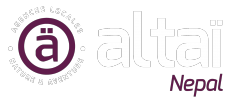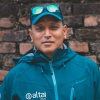Annapurna Single Track Circuit
Itinerary
-
Day 1 Arrival in Kathmandu
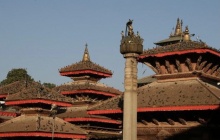 Arrival in Kathmandu (1360m): Welcome to the capital of Nepal. If your arrival time permits, you can enjoy a walking tour of the bustling city of gods. Your local guide can introduce his hometown with its old streets, temples and shops offering a first glimpse into Nepalese life.
Arrival in Kathmandu (1360m): Welcome to the capital of Nepal. If your arrival time permits, you can enjoy a walking tour of the bustling city of gods. Your local guide can introduce his hometown with its old streets, temples and shops offering a first glimpse into Nepalese life.
Accommodation: Hotel
-
Day 2 Tracks around Kathmandu
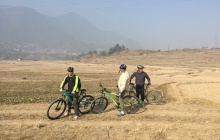 Today you go for a warm-up tour exploring some of the best trails in the Kathmandu Valley. So you test your bikes and gear to make sure everything is ready for the ride ahead. In about 4 hours of mountain biking, we will cover about 35 kms at a brisk pace while exploring the valley regions, using unique tracks and visiting some selected temples before returning to Kathmandu. You also make some last minute adjustments on the bikes and the final preparations and checks before the start of our big ride.
Today you go for a warm-up tour exploring some of the best trails in the Kathmandu Valley. So you test your bikes and gear to make sure everything is ready for the ride ahead. In about 4 hours of mountain biking, we will cover about 35 kms at a brisk pace while exploring the valley regions, using unique tracks and visiting some selected temples before returning to Kathmandu. You also make some last minute adjustments on the bikes and the final preparations and checks before the start of our big ride.
Accommodation: Hotel
-
Day 3 Drive: Kathmandu to Beshisahar
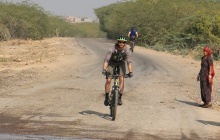 An early start to the day, where we'll enjoy some Himalayan-grown coffee before heading out on the 6-hour drive to Besisahar. Outside of busy Kathmandu, we'll get to see the beautiful countryside of Nepal. with it's many green, terraced fields, and there will be time to enjoy the views and have lunch. Once in Besisahar, we'll begin preparing for the next day's ride, as well as meeting our local porters for the trip. We'll have our first welcome dinner and overnight in a cozy teahouse, the first of many on the trip!
An early start to the day, where we'll enjoy some Himalayan-grown coffee before heading out on the 6-hour drive to Besisahar. Outside of busy Kathmandu, we'll get to see the beautiful countryside of Nepal. with it's many green, terraced fields, and there will be time to enjoy the views and have lunch. Once in Besisahar, we'll begin preparing for the next day's ride, as well as meeting our local porters for the trip. We'll have our first welcome dinner and overnight in a cozy teahouse, the first of many on the trip!
Accommodation: Lodge
Drive: 6 hour -
Day 4 Track: Besisahar (760m) - Tal (1700m)
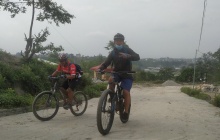 After breakfast, it's time to set out on our first day of riding. Fresh out of Besisahar and finally onto some real Himalayan singletrack! We'll begin to whittle away at the 1,000 meters of climbing for the day. Our path takes us along the Marsyandi River, and though we're not yet in the highest altitude section of the trip, the views are simply beautiful. We'll arrive in Tal, situated in a deep gorge, and surrounded by terraced farms perched impossibly on the steep slopes of Himalayan foothills. Our overnight is in another local teahouse, where we'll refuel and keep warm.
After breakfast, it's time to set out on our first day of riding. Fresh out of Besisahar and finally onto some real Himalayan singletrack! We'll begin to whittle away at the 1,000 meters of climbing for the day. Our path takes us along the Marsyandi River, and though we're not yet in the highest altitude section of the trip, the views are simply beautiful. We'll arrive in Tal, situated in a deep gorge, and surrounded by terraced farms perched impossibly on the steep slopes of Himalayan foothills. Our overnight is in another local teahouse, where we'll refuel and keep warm.
Accommodation : Lodge
Distance: - 37.4 km -
Day 5 Track: Tal (1700m) - Chame (2670m)
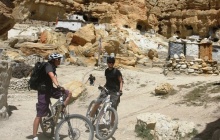 It wouldn't be a the Himalaya if there was no climbing, and today is no exception as we work our way up. The elevation in Chame, our destination for the day, puts us within the "high altitude" category, of over 2,500 meters. This is one to take slowly, and let your body adjust. Today's route is challenging; with steep uphills on rugged singletrack. Thick jungle surrounds us, interspersed with views of the river. So rests to catch your breath and take in the views are well worth it! We'll overnight in the village of Chame, a key spot on the Annapurna trekking circuit, and we'll be in the company of trekkers and local Sherpa.
It wouldn't be a the Himalaya if there was no climbing, and today is no exception as we work our way up. The elevation in Chame, our destination for the day, puts us within the "high altitude" category, of over 2,500 meters. This is one to take slowly, and let your body adjust. Today's route is challenging; with steep uphills on rugged singletrack. Thick jungle surrounds us, interspersed with views of the river. So rests to catch your breath and take in the views are well worth it! We'll overnight in the village of Chame, a key spot on the Annapurna trekking circuit, and we'll be in the company of trekkers and local Sherpa.
Accommodation : Lodge
Distance: - 22.6 km -
Day 6 Track: Chame (2670m) - Manang (3540m)
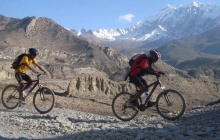 A beautiful ride today, as we climb higher into the Annapurna region, to the village of Manang. Our track widens as the environment changes from jungle to arid alpine and we finally get the sense of being in the high Himalayas. The ride isn't too technical, but the surface can be soft in some places with loose rock. Combined with the rapidly rising altitude, it's a good idea to take things slowly today. At over 3,600 meters, Manang is well beyond high altitude, and we'll feel the effects as we cycle. We'll overnight and acclimatize in a cozy trekking teahouse.
A beautiful ride today, as we climb higher into the Annapurna region, to the village of Manang. Our track widens as the environment changes from jungle to arid alpine and we finally get the sense of being in the high Himalayas. The ride isn't too technical, but the surface can be soft in some places with loose rock. Combined with the rapidly rising altitude, it's a good idea to take things slowly today. At over 3,600 meters, Manang is well beyond high altitude, and we'll feel the effects as we cycle. We'll overnight and acclimatize in a cozy trekking teahouse.
Accommodation : Lodge
Distance: - 29.7 km -
Day 7 Manang Rest and Acclimatisation Day
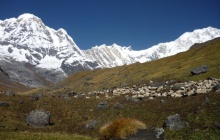 Today's rest and acclimatization day couldn't be in a better spot. The village of Manang is well-equipped for a cozy rest day with coffee shops and even a movie theater, for those looking to take it easy before the ride ahead. If you're feeling adventurous, there are several short side hikes in the area that will offer breathtaking Himalayan views and help acclimatize to the altitude. Manang is home to the Manangi people, who thrive in a high-altitude environment. Lucky travelers get a chance to watch the locals participate in the ancient sports of archery and pony racing. We'll spend another restful evening in a local teahouse, fueling up for another big day.
Today's rest and acclimatization day couldn't be in a better spot. The village of Manang is well-equipped for a cozy rest day with coffee shops and even a movie theater, for those looking to take it easy before the ride ahead. If you're feeling adventurous, there are several short side hikes in the area that will offer breathtaking Himalayan views and help acclimatize to the altitude. Manang is home to the Manangi people, who thrive in a high-altitude environment. Lucky travelers get a chance to watch the locals participate in the ancient sports of archery and pony racing. We'll spend another restful evening in a local teahouse, fueling up for another big day.
Accommodation: Lodge
-
Day 8 Track: Manang (3540m) - Phedi (4450m)
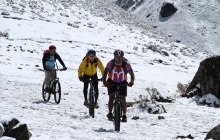 Bidding goodbye to Manang, our course points us higher again. We'll take the ride slow, through the village of Yak Kharka, and further to Thorong Phedi, the base camp of mighty Thorong La, at just under 5,000 meters. The trail runs along a small river valley and is mostly rideable, but very rocky in some sections, where carrying will be necessary. It's best to take this section slowly, as the terrain is loose and prone to sliding. Our expert guide will help you navigate the trail safely as we pass difficult sections along with plenty of local foot-and hoof- traffic. Overnight in a teahouse in Thorong Pedi, where we'll dine heartily after a hard days ride. It's best to get to bed early to get enough rest before the big climb on the following day.
Bidding goodbye to Manang, our course points us higher again. We'll take the ride slow, through the village of Yak Kharka, and further to Thorong Phedi, the base camp of mighty Thorong La, at just under 5,000 meters. The trail runs along a small river valley and is mostly rideable, but very rocky in some sections, where carrying will be necessary. It's best to take this section slowly, as the terrain is loose and prone to sliding. Our expert guide will help you navigate the trail safely as we pass difficult sections along with plenty of local foot-and hoof- traffic. Overnight in a teahouse in Thorong Pedi, where we'll dine heartily after a hard days ride. It's best to get to bed early to get enough rest before the big climb on the following day.
Accommodation: Lodge
Distance: - 19 km -
Day 9 Track: Thorang Phedi (4450m) Thorang La (5416 m) - Muktinath (3760m)
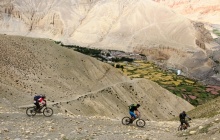 Rise very early to set out for Thorong La at 5 AM. This is the Annapurna Circuit's most famous high altitude pass and the most challenging part of our ride. Reaching the top of the pass, more than 1,300 meters from Thorong Phedi, will require several steady hours of pushing in the cold and high altitude. We'll have assistance from local porters, who will carry our bikes for us, but the climb is still a long slog that will test our spirits. Once at the top, at 5,416 meters, we'll take in the view from both sides, a jaw-dropping forest of snowy peaks that stretch beyond our line of sight. After that comes the real reward- a superb and technical downhill all the way to our rest at the end of the day in the village Muktinath. We'll share stories of the day's ride over a hearty Himalayan feast.
Rise very early to set out for Thorong La at 5 AM. This is the Annapurna Circuit's most famous high altitude pass and the most challenging part of our ride. Reaching the top of the pass, more than 1,300 meters from Thorong Phedi, will require several steady hours of pushing in the cold and high altitude. We'll have assistance from local porters, who will carry our bikes for us, but the climb is still a long slog that will test our spirits. Once at the top, at 5,416 meters, we'll take in the view from both sides, a jaw-dropping forest of snowy peaks that stretch beyond our line of sight. After that comes the real reward- a superb and technical downhill all the way to our rest at the end of the day in the village Muktinath. We'll share stories of the day's ride over a hearty Himalayan feast.
Accommodation: Lodge
Distance: - 22 km -
Day 10 Track: Muktinath (3760m) - Lupra Valley - Jomsom - Tukche
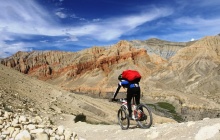 With the most challenging part of the trip behind us, it's on to some fun! Now that we're primarily losing elevation, we can go much further and we'll cover more ground today than in the past several days combined! We head out of Muktinath, traversing a small hillside trail that's mildly technical. There will be a few sections of push, followed by fun and fast singletrack switchbacks all the way down to a valley riverbed. We'll rejoin the main trail in Jomsom and enjoy some tough riding, but with great views, all the way to the lovely traditional village of Tukuche. We'll have some time to enjoy Tukuche,
With the most challenging part of the trip behind us, it's on to some fun! Now that we're primarily losing elevation, we can go much further and we'll cover more ground today than in the past several days combined! We head out of Muktinath, traversing a small hillside trail that's mildly technical. There will be a few sections of push, followed by fun and fast singletrack switchbacks all the way down to a valley riverbed. We'll rejoin the main trail in Jomsom and enjoy some tough riding, but with great views, all the way to the lovely traditional village of Tukuche. We'll have some time to enjoy Tukuche,
Accommodation: Lodge
Distance - 32 km. -
Day 11 Track: Tukche - Tatopani (1190 m)
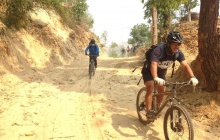 We keep going down. The flat trail starts smoothly and winds along the sides of the valley, through pine forests. We will cross small villages, and, passing the river, discover beautiful views of the snow-capped peaks. We will stop for lunch in Rupse Chhahara, at the edge of impressive waterfalls. Then we will descend nearly 1000m by taking a path made of curves and rocky and bumpy areas. We will arrive in Tatopani, a village famous for its rejuvenation hot springs, with typical pebbles. We will take a long break there, allowing you to enjoy a good relaxing bath or even a local massage unless you prefer to just quench your thirst with a good beer
We keep going down. The flat trail starts smoothly and winds along the sides of the valley, through pine forests. We will cross small villages, and, passing the river, discover beautiful views of the snow-capped peaks. We will stop for lunch in Rupse Chhahara, at the edge of impressive waterfalls. Then we will descend nearly 1000m by taking a path made of curves and rocky and bumpy areas. We will arrive in Tatopani, a village famous for its rejuvenation hot springs, with typical pebbles. We will take a long break there, allowing you to enjoy a good relaxing bath or even a local massage unless you prefer to just quench your thirst with a good beer
Accommodation: Lodge
Distance: 40 Km -
Day 12 Track: Tatopani (1190m) - Beni. Drive Beni to Pokhara
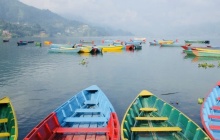 A journey of about 25 km awaits us by jeep on a flat and clear track most of the time, before finding some climbs and descents in the Annapurna region. Arriving in Beni, we will borrow another jeep for our return to Pokhara, and finally a well-deserved rest, and the end of this fantastic mountain bike getaway!
A journey of about 25 km awaits us by jeep on a flat and clear track most of the time, before finding some climbs and descents in the Annapurna region. Arriving in Beni, we will borrow another jeep for our return to Pokhara, and finally a well-deserved rest, and the end of this fantastic mountain bike getaway!
Accommodation: Pokhara.
Distance: - 25 km
Drive: 3 hour -
Day 13 Flight Pokhara to Kathmandu
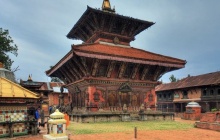 Flight at noon from Pokhara to Kathmandu. Check all your luggage at the hotel, and enjoy an afternoon of shopping, before your last night in Nepal!
Flight at noon from Pokhara to Kathmandu. Check all your luggage at the hotel, and enjoy an afternoon of shopping, before your last night in Nepal!
Accommodation: Hotel
-
Day 14 Departure
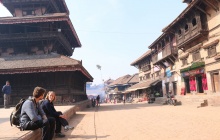 End of stay
End of stay
End of stay
Dates & prices
International departures:
No departure for now
Trip code: NEPANMBK-EN
Included
- All transfers by private vehicle as detailed in itinerary
- 3 * hotel and B&B accommodation in Kathmandu (Hotel Tibet, Manaslu or similar)
- 2 * or 3* hotel accommodation in Pokhara (Hotel Lake View or similar)
- Full board for the trek
- Accompaniment by an English speaking Altaï Guide
- Visits as per itinerary: with a cultural guide and a private vehicle
- Luggage: up to 12kg maximum per person during the trek
- Support Jeep for Mountain Bikes
- Trekking support team: assistants and porters
- Trekking permits: ACAP and TIMS
- Staff Insurance
Not included
- Entrance to historical sites, monuments and museums
- Moubtain Bikes
- Meals in Kathmandu & Kathmandu Valley
- Nepalese visa: US $ 25
- International flights
- Insurance: Repatriation, Medical & Helicopter Services
- Drinks, tips and personal expenses
Notes
Terms and conditions
Booking conditions
Invoice procedure
Cancellation policy
- Cancellation received more than 30 days prior to the departure date: a sum of €50 per person will be retained
- Cancellation received 30 to 21 days before the departure date: your deposit, 30% of the total trip price will be retained
- Cancellation received 20 to 14 days before the departure date: 50% of the total trip price will be retained
- Cancellation received 13 to 7 days before the departure date: 75% of the total trip price will be retained
- Cancellation received less than 7 days before the departure date: 100% of the total trip price will be retained
- Fixed airfares: if your airline ticket was issued in advance, often done to avoid significant surcharges, you will be charged 100% of any non-refundable fees if you wish to change or cancel your flight plan.
- Fixed in-country costs: early charges for firm bookings will be charged if you cancel or modify your trip.
- Insurance costs: if you have taken out comprehensive or cancellation insurance, the cost of insurance is due and cannot be refunded.
Changes to travel contract
Pricing
Contract transfer
Insurance
Practical info
Staff
Food
Accommodation
Transportation
Budget & exchange
Tips
Vital equipment
- Warm Sleeping Bag
- Water purifiers (micropur, aguatabs ...)
- A cap or sunhat
- 1 or 2 sets of thermals: long-sleeved thermal tops and full-length long johns
- Long sleeved and short sleeved t-shirts, preferably in quick-drying technical material
- A light fleece or equivilent (plus extra warm layers if necessary)
- A breathable wind proof, waterproof jacket (Gore-Tex...)
- Lightweight waterproof over trousers
- Suitable shorts
- Walking trousers
- A pair of high-rise walking boots - strength, good grip of the foot and ankle (high stems) and impermeability are essential. Choose shoes with non-slip soles (vibram).
- A pair of trainers/sandels or equivilent casual shoes for cities, villages and evenings
- Thick walking socks
- Warm gloves, hat and scarf (it can be chilly in the mountains)
Material
- Your personal toiletries and a fast drying towel
- Water bottle(s). Min. 2 litres, light and isothermal
- A good pair of sunglasses (think min. category 3)
- Sun-cream, face and lips
- Head torch and spare batteries
- A pocket knife
- A pair of hiking poles
- A waterproof bag cover (or plastic bags) to protect your belongings
- Toilet paper
- Anti-bacterial hand gel
- Your camera
- A notebook or travel journal
Helpful equipment
Luggage
- A rucksack (35-40L or 45-50L) for use as a day bag. This will contain your (vital) personal belongings for the day (sweater, spare t-shirt, water bottle, picnic-lunch, sunglasses, small things ... )
- We use porters to transport our other belongings when trekking. Please bring a flexible travel bag with zips for easy access max 80L and max 13kg (16kg with camping gear). Please do not bring suitcases or other hard bags which the porters cannot transport.
- You may also be able to store some belongings securely at the hotel in Kathmandu.

